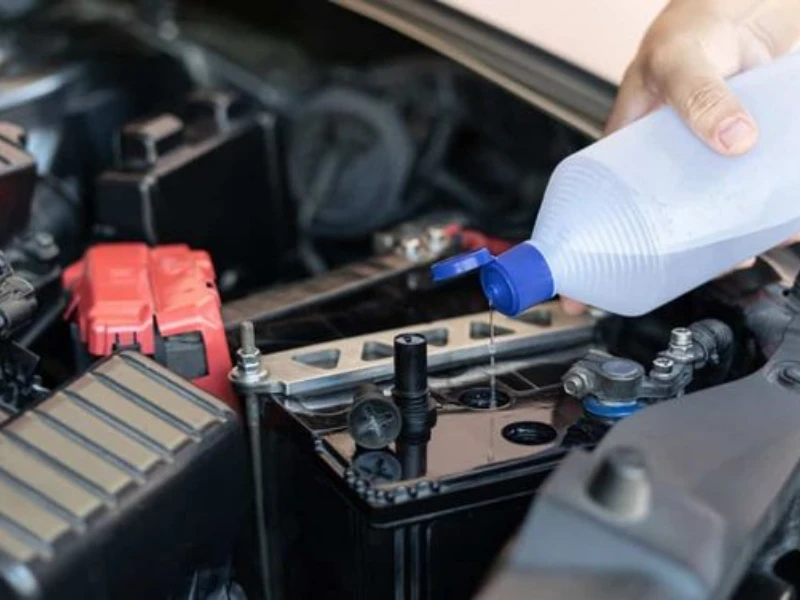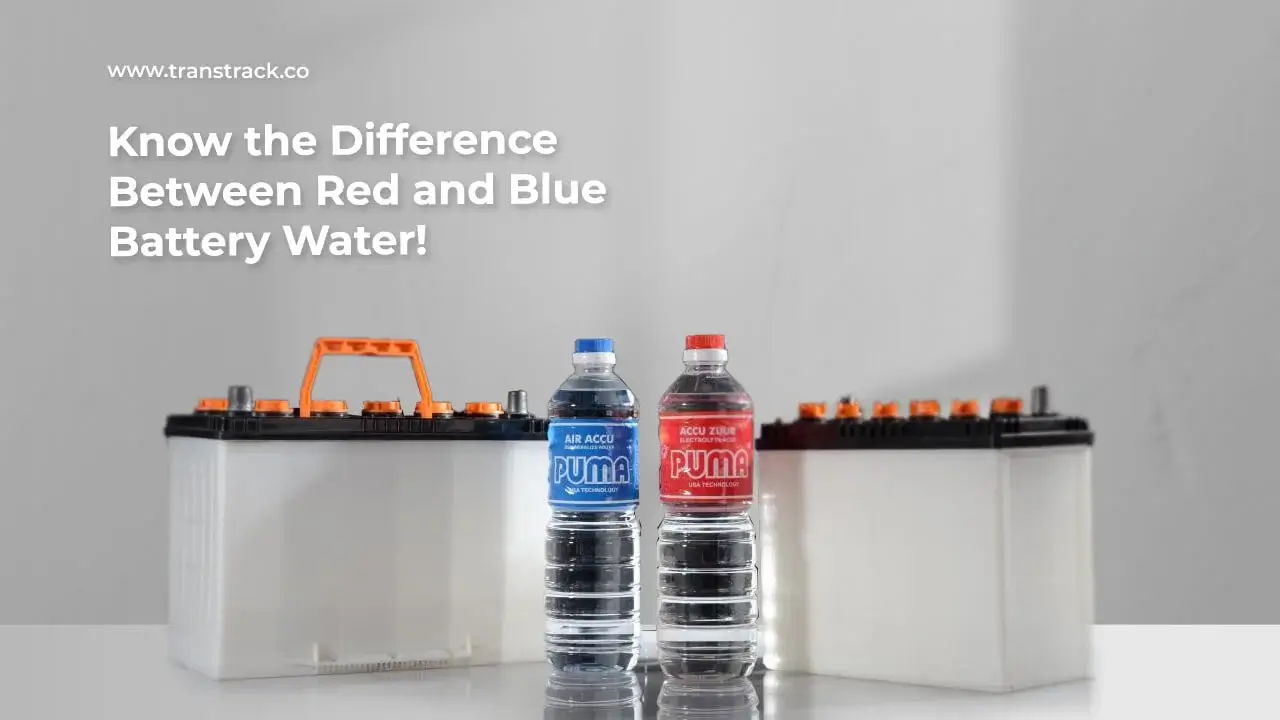Battery water and distilled water are different types of liquids. Both serve unique purposes.
Understanding these differences is crucial for anyone dealing with batteries or chemistry. Battery water is specifically designed for use in batteries. It contains certain minerals necessary for battery function. Distilled water, on the other hand, is pure water. It’s free from minerals, salts, and impurities.
This purity makes it ideal for various applications, like in laboratories and for drinking. Knowing the distinctions between these two can help prevent damage and ensure optimal performance. This blog post will explore how they differ, why it matters, and when to use each type. Let’s dive into the specifics to enhance your knowledge and make informed decisions.

Credit: www.polinovelgroup.com
Introduction To Battery Water And Distilled Water
Battery water, often used in vehicles, contains added acid to enhance performance. Distilled water, on the other hand, is pure with all impurities removed. These differences make each suitable for specific applications, highlighting the importance of choosing the right type for your needs.
Battery water and distilled water often cause confusion. They sound similar but serve different purposes. Understanding these differences can help ensure safe and effective use. Battery water is used in vehicle batteries. Distilled water is used for various household and industrial purposes.Purpose And Usage
Battery water is specifically designed for lead-acid batteries. It helps maintain the battery’s electrolyte level and conductivity. It is essential for battery performance and longevity. Using the wrong type can damage your battery. Distilled water is purified through distillation. This process removes impurities and minerals. It’s used in appliances, laboratories, and for drinking. It is safe for household use and medical applications.Common Misconceptions
Many think battery water and distilled water are the same. They both are free from impurities. Yet, their uses and properties differ. Battery water is not safe for drinking or cooking. Distilled water is safe for consumption. Some believe tap water is suitable for batteries. Tap water contains minerals that can harm batteries. Always use the recommended type to avoid damage. “`
Credit: carts-and-parts.com
Composition Of Battery Water
Understanding the composition of battery water is vital for battery care. Battery water plays a crucial role in battery performance. It is specially formulated to meet the needs of batteries. Unlike regular water, it contains specific additives.
Chemical Additives
Battery water contains chemical additives to enhance its function. These additives help in maintaining the battery’s efficiency. They prevent mineral buildup inside the battery cells. This ensures the battery operates smoothly over time.
Electrolyte Properties
Battery water has unique electrolyte properties. These properties are essential for the battery’s chemical reactions. They help in transferring energy effectively. This ensures the battery delivers power consistently. Proper electrolyte balance is crucial for battery lifespan.
Characteristics Of Distilled Water
Distilled water is purified, free from minerals and impurities, making it ideal for lab use. Battery water is similar but often contains added chemicals to enhance battery performance. Both serve specific purposes, but their uses differ based on purity and chemical content.
When you think of distilled water, what comes to mind? Perhaps it’s the clear, simple liquid you find in a bottle at the grocery store. But this seemingly plain water holds fascinating characteristics that set it apart from regular water. Distilled water is all about purity and precision, and it plays a crucial role in various applications.Purity And Filtration
Distilled water is renowned for its purity. It’s produced by boiling water and then condensing the steam back into a liquid, effectively removing impurities and minerals. Imagine boiling pasta and collecting the steam to make a new pot of perfectly pure water. This process ensures that distilled water is free from contaminants, salts, and unwanted minerals. This level of purity is ideal for situations where mineral deposits could cause harm. For instance, in medical equipment, where even the smallest impurity can lead to malfunction or infection, distilled water is a lifesaver. Have you ever thought about how your coffee maker or iron might benefit from using distilled water to prevent scale buildup? It’s the same principle.Applications In Various Fields
Distilled water’s versatility is impressive. In laboratories, it’s a staple because its purity ensures that experiments aren’t skewed by unknown variables. If you’ve ever conducted a science experiment, you know how important it is to control every factor. Distilled water helps achieve that precision. In the automotive industry, distilled water is used in lead-acid batteries to maintain their performance. Regular tap water can introduce minerals that may corrode battery components. It’s like choosing the right fuel for your car; using distilled water keeps the battery running smoothly. Even in your own home, distilled water can be a game-changer. It’s perfect for humidifiers and steam irons, where mineral-free water prevents clogging and extends appliance life. Have you tried using distilled water for household tasks? The results can be surprisingly effective. Distilled water is a powerful tool because of its purity and versatility. Whether you’re conducting a scientific experiment or trying to prolong the life of your appliances, understanding the characteristics of distilled water can make a world of difference. So, next time you pick up a bottle, consider its many potential uses in your daily life.Battery Water Vs Distilled Water
Understanding the difference between battery water and distilled water is crucial. Both play essential roles in various applications, yet they serve different purposes. Battery water is specifically designed for use in batteries, while distilled water is a purified form of water used in many contexts. Knowing their distinctions can help you choose the right type for your needs.
Physical Differences
Battery water often contains additives and minerals. These enhance the battery’s performance. Distilled water, on the other hand, is pure water. It has no minerals or impurities. Its purity makes it suitable for sensitive applications.
Chemical Differences
The chemical composition of battery water is not pure. It contains sulfuric acid, which is necessary for battery function. This makes battery water more acidic. Distilled water is free from any chemicals. It is neutral, with a pH of around 7. This makes it safe for various uses, including in laboratories and medical equipment.
Impact On Battery Performance
The type of water used in batteries greatly affects their performance. Battery water and distilled water play different roles. Their impact can determine the efficiency and longevity of your battery. Understanding these differences helps in maintaining optimal battery health. Let’s explore how each type of water influences battery performance.
Role Of Battery Water
Battery water is specially formulated for use in lead-acid batteries. It contains essential minerals and additives. These components prevent battery corrosion and extend its lifespan. The water is designed to maintain the right electrolyte balance. This balance is crucial for efficient energy storage and transfer. Without it, battery performance can degrade over time.
Effects Of Using Distilled Water
Distilled water is free from minerals and impurities. It is often used as an alternative to battery water. While safe, it lacks the additives found in battery water. This can lead to faster corrosion and reduced battery life. Using distilled water may require more frequent maintenance. It ensures the electrolyte levels remain balanced. This can be a hassle for some users.
Safety Considerations
Understanding the difference between battery water and distilled water is crucial. Both play a vital role in maintaining battery performance. Yet, safety considerations are often overlooked. Proper handling and knowledge can prevent accidents. Each type requires specific care to ensure safety.
Handling And Storage
Battery water contains sulfuric acid, which is corrosive. Always wear protective gear when handling it. Use gloves and goggles to prevent skin and eye contact. Store battery water in a cool, dry place. Keep it away from children and pets. Distilled water is less hazardous, but still requires care. Store it in clean containers to avoid contamination. Label containers clearly to prevent confusion.
Potential Risks
Exposure to battery water can cause burns and irritation. Inhaling fumes may damage respiratory health. Spills can corrode surfaces, posing additional hazards. Distilled water poses fewer risks. Yet, incorrect use can still harm batteries. Mixing it with other substances can lead to unexpected reactions. Always follow manufacturer guidelines for safe usage.
Environmental Implications
Understanding the environmental implications of battery water versus distilled water is crucial, especially if you are concerned about your ecological footprint. These two types of water serve different purposes but their impact on the environment can be significant. Let’s explore how each is produced and disposed of, and what this means for our planet.
Production Processes
The production of battery water involves chemical treatments to enhance conductivity, which can lead to environmental pollution. Factories might release harmful chemicals into the air and water during the process.
Distilled water, on the other hand, is produced through evaporation and condensation. This is a cleaner process but requires significant energy, often sourced from non-renewable resources. Have you ever thought about how the energy needed for distillation impacts carbon emissions?
Disposal Concerns
Disposing of battery water improperly can cause toxic substances to seep into soil and waterways, harming wildlife. Imagine the damage caused when heavy metals and acids enter our ecosystems.
Distilled water is less harmful when disposed of, but it’s not entirely without environmental impact. The energy used to produce it leaves a carbon footprint. Is the convenience of distilled water worth the environmental cost?
As you weigh the environmental implications of these waters, consider how your choices can affect the planet. Could you take steps to minimize your impact by opting for more sustainable alternatives? The future of our environment might depend on the decisions you make today.

Credit: www.reddit.com
Choosing The Right Water For Your Needs
Choosing the right water for your needs is crucial. Battery water and distilled water are often confused, but they serve different purposes. Understanding their differences can help you make informed decisions. Let’s delve into key factors that differentiate them and guide you in selecting the appropriate one.
Factors To Consider
Battery water is designed for use in vehicle batteries. It contains minerals and additives that enhance battery performance. Distilled water is pure, free from minerals and contaminants. It’s used in applications requiring purity, like laboratory experiments or steam irons.
Consider your intended use. Battery water suits automotive needs. Distilled water fits situations needing cleanliness and purity. Assess the potential impact of minerals on your specific application.
Recommendations For Consumers
For car battery maintenance, choose battery water. It supports better conductivity and longevity. For household appliances, distilled water is ideal. It prevents mineral buildup and ensures smooth operation.
Read product labels carefully. Ensure you select the correct type for your needs. Consult experts if unsure. They can provide advice tailored to your situation.
Understanding the differences empowers you to make smart choices. Choose wisely to achieve the best results for your specific application.
Frequently Asked Questions
Is Battery Water The Same As Distilled Water?
Battery water is often distilled water, but not always. Distilled water is purified and free from minerals. Battery water must be mineral-free to prevent damage. Using distilled water is recommended for battery maintenance. Always check specifications to ensure compatibility.
Can I Use Normal Distilled Water In Battery?
Yes, you can use normal distilled water in a battery. Distilled water prevents mineral buildup, ensuring optimal battery performance and longevity. Avoid tap water as it contains impurities that may harm the battery cells. Regular maintenance with distilled water helps maintain efficiency and extends the battery’s life.
How To Make Battery Water At Home?
Use distilled water to make battery water at home. Boil tap water and collect the steam. Let it condense into pure distilled water. Ensure no minerals or impurities remain. Store in a clean, sealed container. Avoid using regular tap water for battery maintenance.
Can You Use Battery Water In A Cpap?
No, do not use battery water in a CPAP machine. Use only distilled water to ensure safety and proper function. Battery water contains impurities that can harm your CPAP device and health. Always follow the manufacturer’s guidelines for water usage.
Conclusion
Understanding the difference between battery water and distilled water is essential. Battery water is specifically designed for automotive batteries. It contains minerals that help conduct electricity. Distilled water, on the other hand, is pure water without minerals. It’s often used in household appliances.
Using the right type of water ensures battery longevity. Distilled water should not be used in batteries unless specified. Each serves a unique purpose. Choosing the correct water type can prevent damage. Protect your devices with the right choice. Always follow manufacturer guidelines for optimal performance.
Keep your equipment running smoothly and efficiently.
